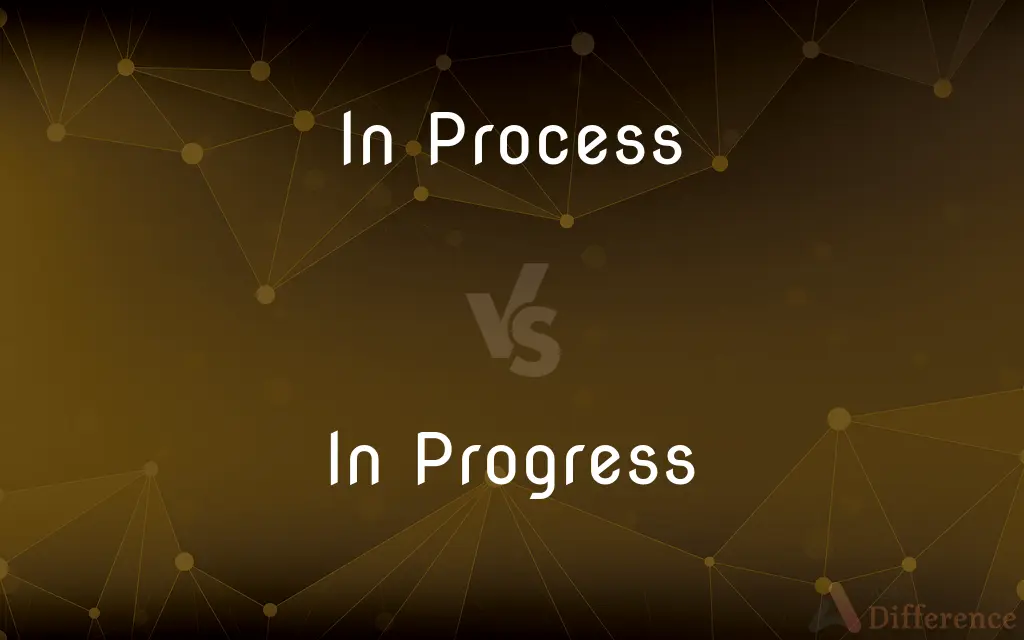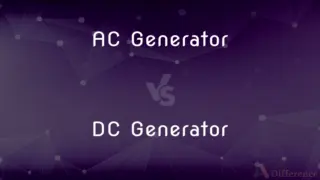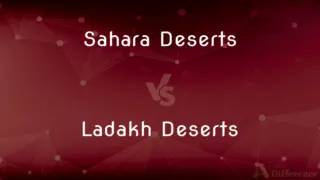In Process vs. In Progress — What's the Difference?
By Tayyaba Rehman — Published on November 5, 2023
"In Process" means something is underway, part of a set operation or sequence, while "In Progress" indicates an ongoing action that has not yet reached completion.

Difference Between In Process and In Progress
Table of Contents
ADVERTISEMENT
Key Differences
"In Process" implies that a subject is undergoing a set series of operations or stages. This term often suggests a more static journey, where the path, consisting of several predetermined steps or procedures, is as significant as the end result. Conversely, "In Progress" suggests dynamic, ongoing action or development that is actively continuing and has not yet reached its conclusion. It's more about the action currently happening rather than the steps being undertaken.
"In Process" often refers to something that is just a portion of a larger operation, indicating that there's a standard, routine, or expected set of procedures that the subject is currently part of. It's a term that fits into the cogs of a larger machine. On the other hand, "In Progress" speaks to the moment, the now, emphasizing the continuous effort, activity, or movement occurring at the present time, without a focus on the larger mechanism or future steps.
In terms of grammar, "In Process" is less commonly used in contemporary American English and might be considered more formal or outdated, whereas "In Progress" is widely used in both informal and formal contexts. "In Progress" is also the standard phrase used in warnings and notifications, such as "Caution: Work in Progress," indicating an active operation that might pose a risk or require attention.
Furthermore, "In Process" is not usually used in casual conversation because it refers to a more mechanical or operational series of events, like in manufacturing or bureaucratic procedures. In contrast, "In Progress" is versatile and appears in various settings, like in everyday conversation about tasks, events, or activities that are currently ongoing, making it a more commonly understood and utilized term.
Importantly, "In Process" has a narrower scope of use, primarily applied in contexts where things follow a specific, ordered set of procedures or stages. "In Progress," however, has a broader application—it's a more universal term for anything that is currently underway, whether it be a meeting, a game, construction work, or a personal project.
ADVERTISEMENT
Comparison Chart
Meaning
Undergoing a set series of operations.
Actively continuing, not yet complete.
Scope
Part of a larger operation or sequence.
Focused on the current, ongoing action.
Grammatical Use
Less common, more formal.
Common in both formal and informal use.
Contextual Use
Specific, ordered procedures or stages.
Universal; any ongoing activity.
Conversational Use
Rarely used in casual conversation.
Frequently used in various settings.
Compare with Definitions
In Process
Undergoing a set series of operations
Your application is in process.
In Progress
Actively continuing
The meeting is in progress.
In Process
Subject to a standard procedure
Your request is in process.
In Progress
Not yet complete
Construction in progress.
In Process
Moving through a specific sequence
The legislation is in process.
In Progress
Ongoing action
The game is in progress.
In Process
Engaged in a routine operation
The data is currently in process.
In Progress
Unfinished activity
Please wait, experiment in progress.
In Process
Part of a larger operation
The component is in process of assembly.
In Progress
Current development
Repairs are in progress.
Common Curiosities
Is "In Progress" used in informal settings?
Absolutely, it's commonly used to describe anything actively ongoing, in formal and informal contexts.
Is "In Process" common in everyday language?
Less so; it's more formal and often used in technical or official contexts.
Can "In Progress" refer to any ongoing activity?
Yes, it's a general term for any action or event that is currently underway.
Does "In Process" imply a routine or standard procedure?
Yes, it usually refers to a subject being part of a set series of operations.
What's a common setting for "In Progress"?
It's often used in work settings, events, or any scenario where an activity is not yet complete.
Are "In Process" and "In Progress" interchangeable?
No, "In Process" refers to a sequence of operations, while "In Progress" refers to ongoing actions.
Is "In Process" specific to certain industries or fields?
It's more common in technical, manufacturing, or bureaucratic contexts.
Can "In Process" be used for manufacturing or bureaucratic contexts?
Yes, it's apt for contexts where a series of predetermined steps are followed.
Does "In Process" imply a lack of completion?
It indicates that something is underway, following a set sequence toward completion.
Is "In Process" an outdated term?
It's less common and might be considered more formal, but not necessarily outdated.
Does "In Progress" have a formal tone?
It can be used in both formal and informal contexts without a change in tone.
Does "In Progress" only refer to long-term activities?
No, it can refer to any activity that is actively continuing, short or long-term.
Can "In Progress" imply potential danger or caution?
Yes, especially in signs like "Caution: Work in Progress."
Can "In Process" indicate a time frame?
Not specifically; it shows something is underway but not the duration.
Does "In Progress" show immediacy?
Yes, it indicates something is happening in the present moment.
Share Your Discovery

Previous Comparison
AC Generator vs. DC Generator
Next Comparison
Sahara Deserts vs. Ladakh DesertsAuthor Spotlight
Written by
Tayyaba RehmanTayyaba Rehman is a distinguished writer, currently serving as a primary contributor to askdifference.com. As a researcher in semantics and etymology, Tayyaba's passion for the complexity of languages and their distinctions has found a perfect home on the platform. Tayyaba delves into the intricacies of language, distinguishing between commonly confused words and phrases, thereby providing clarity for readers worldwide.













































